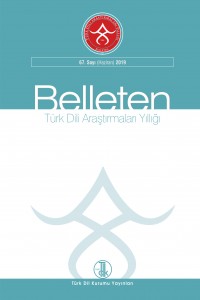Öz
Anahtar Kelimeler
Kaynakça
- Bahavudun, M. vd. (2002). Çaġatay tiliniñ izahliq luġiti. Ürümçi: Şincañ XelqNeşriyati.
- İmam, H.A. vd. (2011). Uyġur tiliniñ izahliq lüġiti. (Qisqartilmiş) 2. Baskı. Ürümçi:Şincañ Xelq Neşriyati.
- İnayet, A. (1997). Çağdaş Uygur şiiri. Tük Dünyası İncelemeleri Dergisi, II, 191-205.
- Karaman, A. (2016). Avazliq Oqya & Ḳiriḳ Bir Yürek’te fiil+(I) p + art fiil yapıları.Ankara: Gazi.
- Sincon, D. (1997). Uyġurçe-İngilizçe luġeti. Ürümçi: Şincañ Xelq Neşriyati.
- Uyġur tiliniñ izahliq luġiti (1999). Ürümçi: Şincañ Xelq Neşriyati.
Öz
Having a long history, the Modern Uighur Literature had a very active
period at the beginnings of the 20th century. Renovation movements
and political events of the era had an important role in the formation of literature. These alterations stood out in poetry continuing its existence
under the influence of the classical literature until the beginnings of the
century. During 1980s, a new poetic style named as “Yéñiçe poetry” or
“Guñga poetry” was started to be seen in the Modern Uighur poetry.
The Yéñiçe poetry movement spreading among young poets led to various
discussions. At the beginning, such kind of poems were named as
“Tutuq poem”, “Tépişmaqliq poem”, “Guñga poem”, and “Symbolist
poem”. “However, “Guñga poem” was used more frequently. This understanding
of poetry based on ambiguity has differentiated the word
framework of the poems. Grammatical changes are also seen in “Guñga”
poems. According to the poets writing “Guñga poem”, poetry is an
art of language. For this reason, making changes freely is among the
requirements of poetry. As generally considered, the “Guñga Poem”
shows similarities with symbolic and surrealistic poems. Beginning
with Ahmetcan Osman, this poetry movement is carried on with Ferhat
Ilyas and Vahitcan Osman.
Anahtar Kelimeler
Kaynakça
- Bahavudun, M. vd. (2002). Çaġatay tiliniñ izahliq luġiti. Ürümçi: Şincañ XelqNeşriyati.
- İmam, H.A. vd. (2011). Uyġur tiliniñ izahliq lüġiti. (Qisqartilmiş) 2. Baskı. Ürümçi:Şincañ Xelq Neşriyati.
- İnayet, A. (1997). Çağdaş Uygur şiiri. Tük Dünyası İncelemeleri Dergisi, II, 191-205.
- Karaman, A. (2016). Avazliq Oqya & Ḳiriḳ Bir Yürek’te fiil+(I) p + art fiil yapıları.Ankara: Gazi.
- Sincon, D. (1997). Uyġurçe-İngilizçe luġeti. Ürümçi: Şincañ Xelq Neşriyati.
- Uyġur tiliniñ izahliq luġiti (1999). Ürümçi: Şincañ Xelq Neşriyati.
Ayrıntılar
| Birincil Dil | Türkçe |
|---|---|
| Bölüm | Araştırma Makalesi |
| Yazarlar | |
| Yayımlanma Tarihi | 1 Haziran 2019 |
| Yayımlandığı Sayı | Yıl 2019 Sayı: 67 |


